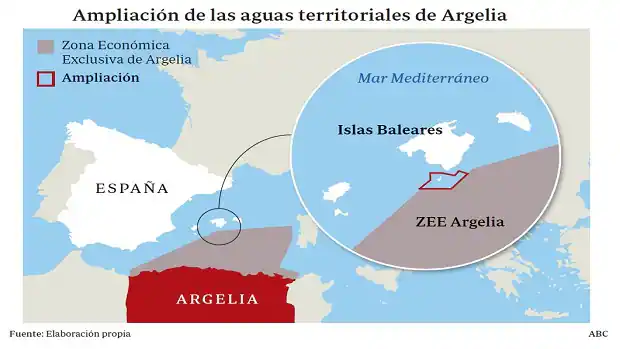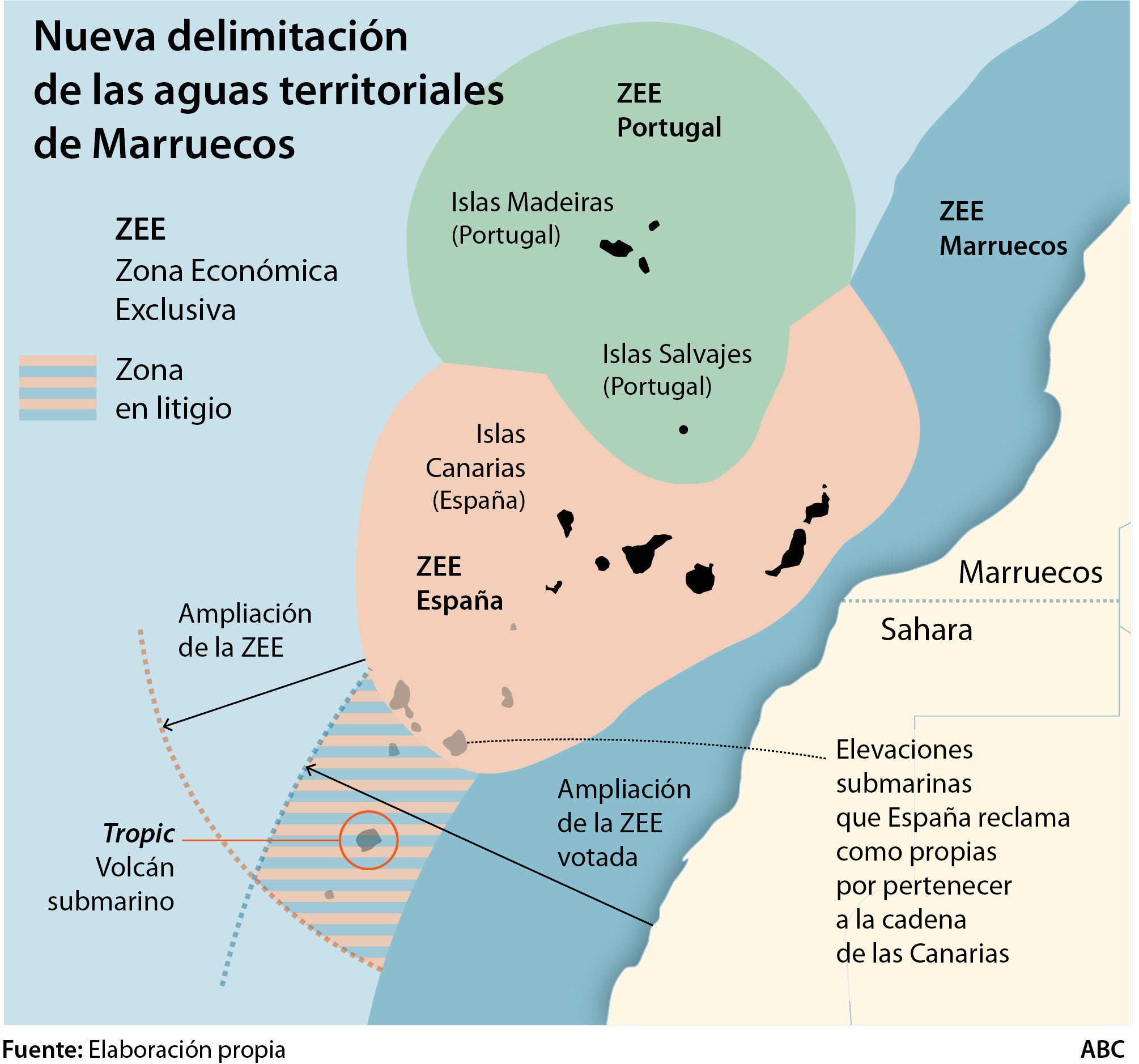
In 1963 the "War of the Sands" (Guerre des sables)[1] took place between Morocco and Algeria due to the hegemonic rivalry of the area in the middle of the Cold War, due to the issue of Western Sahara and the problem left by the decolonization of the two countries, and which still continues with the indefinition of the borders between the two countries. Morocco wanted to obtain the territory of the provinces of Tindouf and Béchar, which France had annexed to the Algerian country decades before. This conflict only attracted international interest after Cuba and Egypt supported the Algerian country, which caused the two blocks to turn their attention to the conflict. Now in 2020 and although it seems implausible, the two countries have found a new common enemy with which they seem to want to continue their escalation of hegemony in the Maghreb area. That common enemy is none other than Spain.

In recent times, both Algeria and Morocco, which proclaim themselves "friendly states", have initiated a series of actions to redefine their maritime borders and their dominion over these waters and, in turn, over the riches that these waters conceal. As far as the Algerian country is concerned, for the last two years it has extended its jurisdictional waters affecting Spanish nation in part of the waters of the Balearic Islands. Despite the fact that the matter has been going on for a long time and Spain was very weakly opposed two years ago to the Algerian provision which declared it to be so, there are no negotiations on this subject to date.[2]
Despite the fact that different political groups in the Spanish Parliament have presented various initiatives demanding a forceful response from the Spanish executive towards the Algerian authorities, both the Spanish and Algerian governments, through the Spanish Minister of Foreign Affairs and her Algerian counterpart, state that they agree "100% that the maritime borders should be negotiated bilaterally" and that a summit on this issue is being held in the second half of 2020.[3]
At the same time, and from the Kingdom of Morocco, it seems that it has set its eye on the waters surrounding the Canary Islands and on the resources hidden there, taking as a reference the waters of Western Sahara, which since 1975 after the departure of Spain from the area occupied it and which the UN maintains as an area "pending decolonisation". The lower house of the Moroccan parliament approved last December 2019 two bills that had been approved in committee days before and that seek to extend the territorial waters and obtain sovereignty over a 200-mile exclusive economic zone (EEZ) unilaterally without negotiation with the kingdom of Spain. The project was stopped after the protest of the Minister of Defence, Margarita Robles, who indicated to the authorities of the neighbouring country that a variation of the maritime borders in a unilateral way would not be accepted, and the president of the Canary Islands Community, Ángel Víctor Torres.[4]

Once the new Spanish coalition government is in place following the agreements of the legislature with various partners after the last general elections, Morocco resumes its project. On 24 January this year, the Spanish government's foreign minister travelled to Morocco to meet her Moroccan counterpart, Burita, with whom she discussed the issue and made initial contact to discuss issues of common interest. Subsequently, the procedure is resumed in the Moroccan upper house in February this year where they are approved. And finally the Prime Minister endorsed them with his signature on March 6, 2020. Finally, the two laws declaring the sovereignty of Morocco over the 12 miles and the exclusive economic zone (EEZ) of 200 miles from its coasts were published in the Official Bulletin of Morocco on 30 March.[5]
The head of Moroccan diplomacy said that "although they are an act of sovereignty within the International Law of the Sea, the declaration of the zones could create overlaps with neighbouring countries, in particular with Spain, and that these overlaps should be resolved through dialogue". Furthermore, during the processing of the laws, he affirmed the importance they have for his legislative body, especially with regard to Western Sahara, an area that Morocco considers to be a southern province. In turn, the Spanish Minister of Foreign Affairs has reflected in her Twitter account two messages in which she indicates the knowledge about what the Moroccan legislature has legislated: "Nothing new. We were aware of its content, of a general nature, during its parliamentary process" and "Spain and Morocco agree that the maritime delimitation will require resolving the possible overlapping of spaces by mutual agreement and in accordance with International Law ".
Also in February, in the Congress of Deputies, he affirmed that "by approving these laws, Morocco is making use of its powers within the law of the sea" as well [6]as Spain and the other countries that have ratified these agreements. And that therefore where there is an overlap of two jurisdictions there only remains the negotiation until an agreement is reached by both parties. Furthermore, it established that one must not fall into scaremongering and that, once studied in depth and with care, the Spanish government reserves the right to react as it sees fit.

For their part, the authorities of the Canaries have approved a declaration by their Governing Council in which they show "their position and disagreement" with the unilateral approval of the rules by the Moroccan authorities.[7] It also demands maximum firmness from the Central Government in the solution to the problem, within International Law. The Canarian waters hide in their depths Tellurium, Cobalt and other metals highly valued by the technological industry is what lies under the waters in dispute of Spain and Morocco. Of the predictably rich underwater volcanoes, the only one that does not lie within 200 miles of the Spanish EEZ is 'Tropic', which studies point to as the largest natural reserve of tellurium known to date. Some 2,600 tons of a metal that pays between 200 and 500 dollars per kilo. Since it is outside the EEZ, Spain is requesting the extension of its continental platform, so it would also be under national sovereignty. Of course, Morocco is also fighting for it, using the occupied territory of Western Sahara to recalculate its maritime border.
It is obvious that Morocco and Algeria have "smelled" the weakness of the Spanish government and its lack of political weight both nationally and internationally and within international institutions. In 1975, when the regime of General Franco was giving its last breaths, Morocco took advantage of it with the Green March and the occupation of Western Sahara after the departure of the last Spanish troops. Subsequently, many times in any fishing or agricultural negotiations, Morocco has threatened to be lighter on the issue of immigration or its fight against jihadist terrorism.
 Currently it is only need to see how the crisis of the Covid-19 is being controlled or rather with the lack of control that the crisis is being managed, the pandemic within our borders as well as outside when it comes to obtaining medical and health supplies in international markets, such as the response we are getting from alleged partners or allies in supranational institutions such as NATO or the European Union (collision with Turkey on the issue of respirators, finally resolved). In fact, at the meeting of NATO's foreign ministers, by video conference, he expressed gratitude to the Czech Republic and Turkey "for the assistance received within the framework of existing channels within the Alliance to combat the effects of Covid-19".[8]
Currently it is only need to see how the crisis of the Covid-19 is being controlled or rather with the lack of control that the crisis is being managed, the pandemic within our borders as well as outside when it comes to obtaining medical and health supplies in international markets, such as the response we are getting from alleged partners or allies in supranational institutions such as NATO or the European Union (collision with Turkey on the issue of respirators, finally resolved). In fact, at the meeting of NATO's foreign ministers, by video conference, he expressed gratitude to the Czech Republic and Turkey "for the assistance received within the framework of existing channels within the Alliance to combat the effects of Covid-19".[8]
It took a lot of time, a lot of work and a lot of sacrifice from people of different political creeds for Spain to enter international institutions both in Europe and worldwide and to have a fundamental position in international relations, due to its geographical location as well as its history. All this work cannot be thrown away, because of a lassitude attitude in the relations with our neighbours. These are times of difficult decisions, which are very sensitive on a political level and many of them have no effect in the very short term. Spain's future role on the world stage depends on dynamic but firm solutions at both the national and international levels and with political leadership.
[1] https://www.traficantes.net/libros/la-guerra-de-las-arenas-1963
[2] https://www.europapress.es/nacional/noticia-espana-opuso-hace-anos-plan-argelino-delimitacion-aguas-afecta-baleares-aun-no-hay-negociacion-20200219155856.html
[3] https://www.europapress.es/nacional/noticia-espana-argelia-muestran-cien-cien-acuerdo-frontera-maritima-debe-negociar-20200304165228.html
[4] https://www.elmundo.es/espana/2020/01/22/5e2815c6fdddff36808b4589.html
[5] https://www.europapress.es/nacional/noticia-marruecos-culmina-tramitacion-leyes-delimitacion-maritima-20200331122234.html
[6] https://www.europapress.es/nacional/noticia-gobierno-toma-nota-aprobacion-leyes-maritimas-marruecos-valorando-medida-20200331132820.html
[7] https://www.eldia.es/portada/2019/12/18/marruecos-amplia-fronteras-maritimas-e/1034314.html
[8] http://www.exteriores.gob.es/Portal/es/SalaDePrensa/ElMinisterioInforma/Paginas/Noticias/20200403_MINISTERIO6.aspx
 Copyright secured by Digiprove © 2020 Quixote Globe
Copyright secured by Digiprove © 2020 Quixote Globe